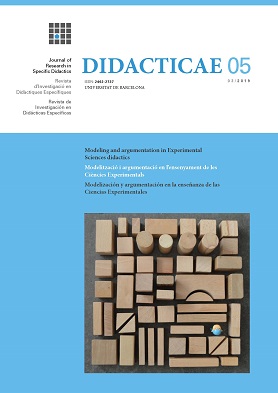Relaciones de cooperación y especialización entre la argumentación y múltiples lenguajes en la clase de Ciencias
Relations of cooperation and specialization between argumentation and multiple languages in Science class
DOI:
https://doi.org/10.1344/did.2019.5.57-72Keywords:
argumentation, multimodality, intersemiotic interaction, intrasemiotic interactionAbstract
Multimodal argumentation facilitates the recognition of the multiple languages used in an argumentative process and allows to identify, in the students, the understanding of the scientific concepts discussed in the classroom. The main goal of this study is to identify and describe the languages used by first year students of secondary school and their interaction in the argumentative processes on the concept of intra- and interspecific relationships in living beings in Science class. This is an investigation of a descriptive and comprehensive nature. In it, argumentative scenarios were created, recorded and systematized, and analyzed from a qualitative perspective. The results show that increasing the level of specialization can be interpreted as a possibility to increase the argumentative level of students and, with it, the level of understanding of Science topics.
References
Aduriz-Bravo. A. (2005). Una introducción a la naturaleza de la ciencia. México: Fondo de Cultura Económica.
Cardona, D. 2008. Modelos de argumentación en ciencias: una aplicación a la genética. Tesis. Editorial Centro de Estudios Avanzados en Niñez y Juventud. Colombia. Alianza de la universidad de Manizales y CINDE.
Giere, R. (1999). Un nuevo marco para enseñar el razonamiento científico. Enseñanza de las Ciencias, núm. extra, 63-69.
Habermas, J. (2003). Acción comunicativa y razón sin trascendencia. Barcelona: Paidós.
Halliday, M. (2013). El lenguaje como semiótica social. México: Fondo de Cultura Económica.
Izquierdo, M. (2006). Por una enseñanza de las ciencias fundamentada en valores humanos. Revista Mexicana de Investigación Educativa, 11(30), 867-882.
Jewitt, C. (2013). Learning and communication in digital multimodal landscapes. London: Institute of Education University of London.
Kelly, G. J. y Takao, A. (2002). Epistemic levels in argument: An analysis of university oceanography students’ use of evidence in writing. Science Education, 86, 314-342.
Kress, G. (2005). El alfabetismo en la era de los nuevos medios de comunicación. Granada, España: Ediciones Aljibe.
Kress, G. Jewitt, C, Ogborn J., y Tsatsarelis, C (2001). Multimodal teaching and learning: The rhetorics of the science classroom. London and New York: Continuum.
Kress, G. y Van Leeuwen, T. (2006). Reading Images: The grammar of Visual Design. London: Routledge.
Knuutilla, T. (2005), Models, representation, and Mediation, Philosophy of Science, 72, 1261-1271.
Leitao, S. (2000). The potential of argument in knowledge building. Human Development, 43(3), 332–360.
Lemke, J. (1997). Aprender a hablar ciencia. Barcelona: Ediciones Paidós.
McNeill, D. (Ed.) (2000). Language and gesture: window into thought and action. Cambridge: Cambridge University Press.
Osborne, J., Erduran, S. y Simon, S. (2004). Enhancing the quality of argumentation in school Science. Journal of Research in Science Teaching. 41(10), 994- 1020.
Plantin, C. (1998). La argumentación. Barcelona: Planeta.
Ruiz, F., Tamayo, Ó., y Márquez, C. (2013). La enseñanza de la argumentación en ciencias: un proceso que requiere cambios en las concepciones epistemológicas, conceptuales, didácticas y en la estructura argumentativa de los docentes. Revista Latinoamericana de Estudios Educativos, 9(1), 29-52.
Ruiz Ortega, F. J., Tamayo Álzate O. E., y Márquez Bargalló C. (2015). La argumentación en clase de ciencias, un modelo para su enseñanza. Educaçäo e Pesquisa, 41(3), 629-646.
Sadler, T., y Fowler, S (2006). A threshold model of content knowledge transfer for socioscientific argumentation. Science Education, 90(6), 986-1004. doi: 10.1002/sce.20165
Sanmartí N. (2007). Evaluar para aprender. 10 ideas clave. Barcelona: Ed. Graó.
Sardá J, A. y Sanmartí, N. (2000). Enseñar a argumentar científicamente: un reto de las clases de ciencias. Enseñanza de las Ciencias, 18(3), 405-422
Toulmin, S. (1958). The uses of argument. Cambridge, England: Cambridge University Press.
Van Dijk, T.A. (1984). Enhancing the Quality of Argument in School Science. Paper presented at the Annual Conference of the British Educational Research Association. Amsterdam. September. Wales.
Van Eemeren, F., Grootendorst, R., y Snoeck Henkemans, F. (2006). Argumentación: análisis, evaluación y presentación. Buenos Aires: Biblos.
Walton, D. (2003). Relevance in argumentation. Amsterdam/Philadelphia: Routledge.
Downloads
Published
Issue
Section
License
Copyright (c) 2019 Francisco Javier Ruiz Ortega

This work is licensed under a Creative Commons Attribution-ShareAlike 4.0 International License.
The authors who publish in this journal agree to the following terms:
- Authors retain copyright and grant the journal the right of first publication.
- Submitting a paper does not involve paying any fees.
- Texts will be published under a Creative Commons Attribution Share-Alike 4.0 International License that allows others to share the work, provided they include an acknowledgement of the work’s authorship, its initial publication in this journal and the terms of the license.
- When citing works published in Didacticae, both the autor and the journal must be cited.
- Didacticae does not accept any responsibility for the points of view and statements made by the authors.



